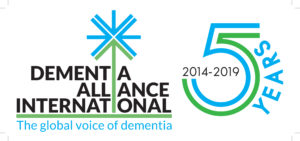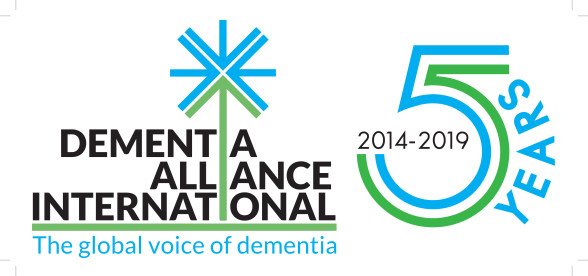 Announcing the DAI Side Event during 12thSession of the Conference of States Parties to the UN CRPD.
Announcing the DAI Side Event during 12thSession of the Conference of States Parties to the UN CRPD.
Dementia Alliance International is pleased to announce we have been accepted to host a Side Event at the upcoming 12th Conference Of State Parties (CoSP) on the Convention On the Rights of Persons with Disabilities (CRPD) at the United Nations in New York on June 13, 2019. We are honoured to have a number of co hosts supporting this event, and to be supported by the United Nations and World Health Organisation, as well as the Australian government.
Dementia: the leading cause of disability
DAI Side-event during 12thSession of the Conference of States Parties to the UN CRPD
In 2019, the Dementia Alliance International (DAI) is celebrating 5 years of existence, and at this Side Event, we recognise the progress that has been made by people with dementia in the advancement of the rights of persons with dementia, as persons living with acquired cognitive disabilities.
Through the side-event, DAI aims to highlight the progress made towards claiming their rights as persons with cognitive disabilities over the past 5+ years, aiming to highlight dementia as a disability, and identify areas of further collaboration between the members of DAI and its international partners and all relevant stakeholders, including United Nations agencies.
The overarching theme is of social inclusion and health, which are two of the determinants of well-being, both of which are being systematically denied to people with dementia all around the world, including in the developed countries.
We will hear from an eminent list of speakers, on the rights of persons with any type of disability, including dementia, to full and equal access to the CRPD, and specifically on the right to rehabilitation and to Universal Health Care.
Speakers:
We are honoured to have Mrs. Catalina Devandas Aguilar, the UN Special Rapporteur on the rights of persons with disabilities to open the Side Event. Other speakers will discuss the relevance of their work to dementia as a disability; e.g. Bethany Browne from Human Rights Watch will discuss the abuse through chemical restraint of people with dementia living in USA nursing homes, from the Human Rights Watch report, "They Want Docile."
Mrs. Catalina Devandas Aguilar, UN Special Rapporteur on the rights of persons with disabilities: opening the Side Event
Christine Thelker, DAI Board Member:“Dementia as a disability”
Bethany Brown, Researcher, Older People’s Rights, Disability Rights Division, Human Rights Watch: “Violations of the rights of older people with dementia”
Arlene Pietranton, American Speech-Language-Hearing Association: “Rehabilitation for dementia and aphasia”
Mr. Antony Duttine, Regional Advisor in disabilities and rehabilitation, Pan American Health Organization/World Health Organisation (PAHO/WHO): “QualityRights”
Jan Monsbakken, Global Rehabilitation Alliance: “The Rights to Rehabilitation for All”
Kate Swaffer, Dementia Alliance International, Chair/CEO: Closing remarks
Background and history
Dementia Alliance International (DAI) is a 501(c)3 registered charity, and is the world’s leading organisation exclusively for people diagnosed with any type if dementia. It is an advocacy and support group of, by and for people with dementia, and the “theglobal voice of dementia”currently representing members in 49 countries. DAI’s vision is “A world where people with dementia are valued and included”. DAI represents the 50 million people currently living with dementia, and the projected 82 million in 2030 and 152 in 2050. Our membership is currently represented in 49 countries around the world, including many members living in the Low and Middle Income Countries.
From grassroots advocacy to global activism, DAI seeks to claim the human rights of people with dementia and ensure that our rights as disabled persons are secure. Dedicated to empowering all people to live a better life with dementia, DAI believes in the power of energy, creativity, human connections and joy as the shared inheritance of every human on earth. Our members advocate and educate locally, nationally and internationally. We speak at professional conferences and lead vast online communities of people. We work to reduce stigma and discrimination, bringing awareness to the truth that life can be well-lived beyond any diagnosis or disability, including dementia.
Concluded by the OECD in 2015, “people with dementia receive the worst care of any disease in the developed world” and indeed, DAI members report, anywhere in the world.
While it is challenging to fix serious problems that are global in scale, we have done it before. As a species, we have eradicated smallpox and polio. We have increased global life expectancy and we have reduced global childhood mortality rates.
The challenges we face are big, but this will not drive us to inaction and hopelessness, for we each carry the burden of making things better in our own chosen sphere.
We didn’t choose to have dementia, but we do choose to work towards a world where we have equal social inclusion as all others, and full and equal access to universal health care, including rehabilitation, and proactive disability assessment and support immediately after a diagnosis.
At Dementia Alliance International, we believe it is imperative to change misconceptions about dementia, address stigmas associated with it, discourage psychological and physical abuse of all disabled people, and demand that the voices of people with dementia be included in decisions directly affecting us. The stigma and discrimination experienced by people with dementia – and their families – is very real and incredibly disabling. Countering the myth that people with dementia go from the point of diagnosis, immediately to the end-stages of the disease, is extremely important.
At present, people with dementia are disenfranchised upon diagnosis. Our legal and social status is immediately reduced, and our human rights are stripped away. We are excluded from equal and full inclusion in public spaces and activities and even viewed by some as “less than human”. Much of our work centers on reducing stigma and discrimination, bringing awareness to the truth that life can be well lived beyond any diagnosis – including dementia. Disability rights are another important arena. Like other disabled persons, we have the right to equal and full inclusion in public spaces and activities. And with appropriate disability support, we can continue to live meaningful and positive lives.
The misguided under-estimations of the potential of people with dementia continue to create oppressive and humiliating barriers to our full and equal engagement in society, and the continuing major breaches of our human rights through the systemic and endemic overuse of chemical and physical restraints, and though segregation and institutionalisation continue. Hence DAI members individually and collectively advocate for rights, and educate locally, nationally and internationally, at professional conferences, and in the vast online communities they have built, so that we are not reduced in legal or social status. DAI is dedicated to empowering all people live a better life with dementia. It advocates for the right to equal and full inclusion in public spaces and activities.
DAI Chair, Kate Swaffer was an invited keynote speaker at the WHO First Ministerial Conference on Dementia in March 2015, and made rights and access to Universal Health Coverage the focus of her presentation. DAI’s global focus has been on human rights and disability rights, and we continue to work with organisations such as the World Health Organisation (WHO), the United Nations and others, to ensure that since the WHO Global action plan on the public health response to dementia 2017 – 2025, was adopted, national, regional or local dementia plans will include human rights, and people with dementia have full and equal access to the CRPD.
DAI is working hard towards ensuring dementia is not left behind in the 2030 Agenda, and its Sustainable Development Goals’ are not only achieved, but that dementia is also realised as a condition causing cognitive disabilities in its own right.
Co-sponsors: the Australian Government, the International Disability Alliance, Human Rights Watch, Alzheimer’s Disease International, Worldwide Hospice Palliative Care Alliance, and the Global Rehabilitation Alliance.

